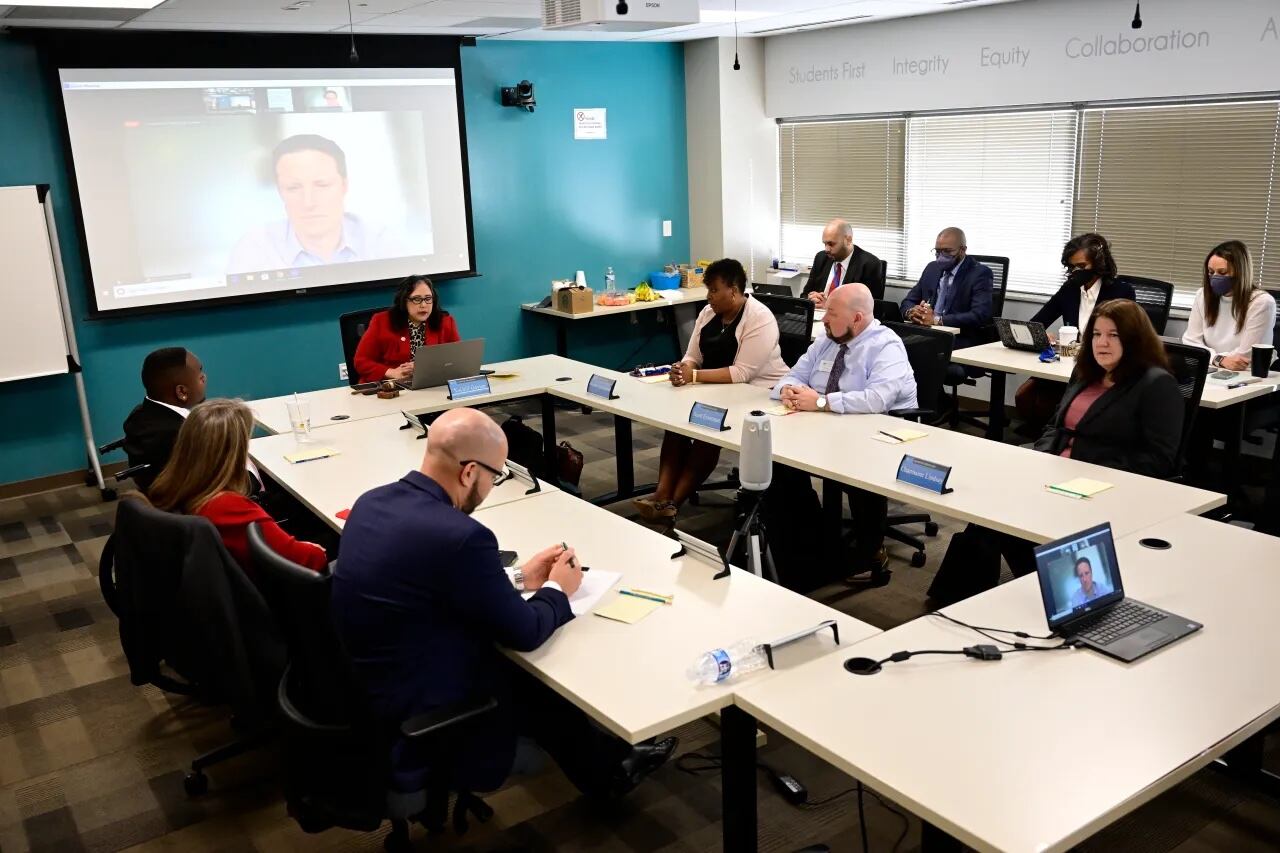Chalkbeat is a nonprofit news organization covering public education in communities across America. Sign up for our free Colorado newsletter to keep up with education news from Denver and around the state.
A new poll commissioned by a group of Denver business leaders finds many voters hold unfavorable views of the Denver school board and nearly 63% believe board members care more about their own political ambitions than about improving educational outcomes for children.
The survey by the Republican firm Cygnal and the Democratic firm Chism Strategies was conducted on April 11 and 12 among 410 likely voters in municipal and off-year elections and has a margin of error of 4.83%.
Mayor and City Council runoff elections are scheduled for June 6, while the school board election isn’t until November.
The group A Denver for Us All commissioned the poll, which also asked respondents about the mayor’s race and issues facing city government. The poll found a close race between Mike Johnston and Kelly Brough, with a slight lead for Johnston and many voters still undecided.
The poll found voters evenly divided between those who feel the city is going in the right direction and those who feel it’s going in the wrong direction.
But when it comes to the Denver school board, nearly 60% of voters had an unfavorable view and just 21% had a favorable view. College-educated respondents, women, and Republicans all were more likely to report unfavorable views of the board. Two-thirds of parents in the poll reported an unfavorable view, compared with 57% of non-parents.
Likely voters in off-year elections are more likely to be white and to have higher earnings than average Denver Public Schools parents. Seventy-three percent of poll respondents were white, while 75% of Denver students are not. This mismatch is common in school board elections.
Across questions, women over 50 years old were among the most concerned with safety and how Denver Public Schools is run, and men under 50 were more likely to report positive views.
The overall findings paint a discouraging picture for school board incumbents seeking re-election in November, but seven months out, it’s not clear what the field will look like or how voter concerns might shift.
Three seats on the seven-member board are open. Of those, only Vice President Auon’tai Anderson has declared his intention to seek re-election to the at-large seat. Asked whether they would re-elect Anderson or whether it’s “time for someone new,” more than half opted for someone new, and just 9% said they planned to vote for Anderson. More than a third of respondents were undecided.
The Denver school board has not yet finalized new district maps that will determine the boundaries of Districts 1 and 5, the other open seats. Kwame Spearman, a former mayoral candidate and recent CEO of the Tattered Cover bookstore, has said he’s considering a run for school board.
The seven-person Denver school board is made up entirely of members who were backed by the Denver Classroom Teachers Association, the teachers union, but the last two years have been marked by infighting and personality conflicts, in particular between Anderson and board President Xóchitl “Sochi” Gaytán.
The school board has grappled with school closure recommendations and budget challenges related to declining enrollment, as well as how to respond to rising community violence.
On March 22, a student whose history required him to undergo daily patdowns shot and wounded two administrators at East High School. The 17-year-old died by suicide later that day. The next day after a lengthy closed session, the Denver school board reversed a 2020 policy and approved stationing armed police officers in Denver high schools.
The Denver district has a low expulsion rate and emphasizes keeping students in school, even when those students have been accused of serious crimes. Principals have said district administrators reject their requests to remove students from the classroom and called for the discipline matrix to be revised, but so far the board and superintendent have defended their policies.
Some parents have called for the entire Denver school board to resign.
The poll tested public opinion on many of these issues, with questions that prompted respondents to see the Denver school board as responsible for recent violence.
“Following the failure of Denver Public Schools (DPS) to prevent the East High tragedy, some have been calling for the entire school board to resign. Would you support the resignations of all the school board members?” the poll asked.
Nearly 39% of respondents said yes, while a third said no, and 28% were undecided or chose neither option. Respondents earning more than $100,000 a year were more likely to support resignation than did those earning less. Men under 50 were the most likely to oppose resignation.
The poll found nearly three-quarters of respondents supported returning police to schools in light of the shooting at East and opposed allowing what the survey described as “students previously known to be troubled and potentially dangerous to others” to return to school.
The poll did not ask respondents about measures like adding more social workers and mental health support or installing metal detectors.
On the open-ended question of what grade respondents would give Denver Public Schools for keeping students safe, 27% of all respondents — and more than a third of parents — gave the district an F, while just 14% gave it an A or a B.
Find complete poll results here.
Bureau Chief Erica Meltzer covers education policy and politics and oversees Chalkbeat Colorado’s education coverage. Contact Erica at emeltzer@chalkbeat.org.






